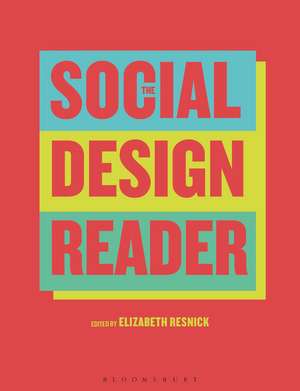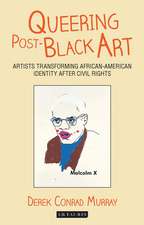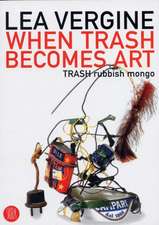The Social Design Reader
Autor Elizabeth Resnicken Limba Engleză Paperback – 10 iul 2019
| Toate formatele și edițiile | Preț | Express |
|---|---|---|
| Paperback (1) | 211.12 lei 3-5 săpt. | +79.05 lei 4-10 zile |
| Bloomsbury Publishing – 10 iul 2019 | 211.12 lei 3-5 săpt. | +79.05 lei 4-10 zile |
| Hardback (1) | 581.86 lei 6-8 săpt. | |
| Bloomsbury Publishing – 10 iul 2019 | 581.86 lei 6-8 săpt. |
Preț: 211.12 lei
Preț vechi: 250.93 lei
-16% Nou
Puncte Express: 317
Preț estimativ în valută:
40.41€ • 43.91$ • 33.97£
40.41€ • 43.91$ • 33.97£
Carte disponibilă
Livrare economică 31 martie-14 aprilie
Livrare express 14-20 martie pentru 89.04 lei
Preluare comenzi: 021 569.72.76
Specificații
ISBN-13: 9781350026056
ISBN-10: 1350026050
Pagini: 496
Ilustrații: 50 BW illus
Dimensiuni: 189 x 246 x 24 mm
Greutate: 1.02 kg
Editura: Bloomsbury Publishing
Colecția Bloomsbury Visual Arts
Locul publicării:London, United Kingdom
ISBN-10: 1350026050
Pagini: 496
Ilustrații: 50 BW illus
Dimensiuni: 189 x 246 x 24 mm
Greutate: 1.02 kg
Editura: Bloomsbury Publishing
Colecția Bloomsbury Visual Arts
Locul publicării:London, United Kingdom
Caracteristici
Social design is a growing area, with dedicated programs at graduate level, and traditional design disciplines taking social design approaches on board
Notă biografică
Elizabeth Resnick is Professor Emerita of Graphic Design at Massachusetts College of Art and Design, USA.
Cuprins
- Preface / Elizabeth Resnick, Massachusetts College of Art and Design, USA Section 1: Making a Stand: A New Social Agenda for Design- Introduction - Elizabeth Resnick, Massachusetts College of Art and Design, USA - Is Social Design A Thing? - Cameron Tonkinwise, University of Technology Sydney, Australia- Social Design: From Utopia to the Good Society - Victor Margolin, University of Illinois at Chicago, USA- Emigré Culture and the Origins of Social Design - Alison J. Clarke, University of Applied Arts Vienna, Austria Section 2: Creating the Future: Defining the Socially Responsible Designer 1964-1999- Introduction - Elizabeth Resnick, Massachusetts College of Art and Design, USA - First Things First Manifesto - Ken Garland, independent scholar, UK- Here Are Some Things We Must Do - Ken Garland, independent scholar, UK- Edugraphology-The Myths of Design and the Design of Myths - Victor Papanek, formerly University of Kansas, USA- Design As A Socially Significant Activity - Clive Dilnot, independent scholar, USA- Designerly Ways of Knowing - Nigel Cross, Open University, UK- The Future Isn't What it Used to Be - Victor Papanek, formerly University of Kansas, USA- Commerce or Culture: Industrialization and Design - John Heskett, formerly Hong Kong Polytechnic University, Hong Kong- Wicked Problems in Design Thinking - Richard Buchanan, Carnegie Mellon University, USA- Good Citizenship: Design as a Social and Political Force - Katherine McCoy, formerly Illinois Institute of Technology, USA- Feminist Perspectives (Design for Society) - Nigel Whitely, independent scholar, UK- There is Such a Thing as Society - Andrew Howard, Escola Superior de Artes e Design, Portugal- Design and Reflexivity - Jan van Toorn, independent scholar, The Netherlands- Design Noir - Anthony Dunne, The New School, USA Section 3: A Sea Change: The Paradigm Shift from Objects to Systems 2000-2020- Introduction - Elizabeth Resnick, Massachusetts College of Art and Design, USA - First Things First Manifesto 2000 - Kalle Lasn, Adbusters, Canada- A "Social Model" of Design: Issues of Practice and Research - Victor Margolin, University of Illinois at Chicago, USA and Sylvia Margolin, independent scholar, USA- The Dematerialization of Design - Jorge Frascara, University of Alberta, Canada- Why Being "Less Bad" Is No Good (Cradle to Cradle) - William McDonough, World Economic Forum, Switzerland and Michael Braungart, Environmental Protection Encouragement Agency, Germany- Clothes That Connect - Kate Fletcher, University of the Arts London, UK- Design's Role in Sustainable Consumption - Ann Thorpe, independent scholar, UK- Transformative Services and Transformation Design - Daniela Sangiorgi, Politecnico di Milano, Italy- Rethinking Design Thinking, Part I - Lucy Kimbell, University of the Arts London, UK- Rethinking Design Thinking, Part 2 - Lucy Kimbell, University of the Arts London, UK- Design Things and Design Thinking: Contemporary Participatory Design Challenges - Erling Bjögvinsson, Gothernburg University, Sweden, Pelle Ehn, Malmö University, Sweden and Per-Anders Hillgren, Malmö University, Sweden- From Design Culture to Design Activism - Guy Julier, University of Brighton, UK- Decolonizing Design Innovation - Elizabeth Tunstall, Ontario College of Art and Design University, Canada- Social Design and Neocolonialism - Cinnamon Janzer, independent scholar, USA and Lauren Weinstein, Australian Centre for Social Innovation, Australia- Futuristic Gizmos, Conservative Ideals: On Speculative Anachronistic Design - Luiza Prado de O. Martins, A Parede, Germany and Pedro Vieira de Oliveira, A Parede, Germany- Privilege and Oppression: Towards a Feminist Speculative Design - Luiza Prado de O. Martins, A Parede, Germany- Is Sustainable Innovation an Oxymoron? - Elizabeth B-N Sanders, MakeTools, UK- Social innovation and design: Enabling, replicating and synergizing - Ezio Manzini, DESIS Network, Italy- Global Methods, Local Designs - Ahmed Ansari, Carnegie Mellon University, USA- The Emerging Transition Design Approach - Terry Irwin, Carnegie Mellon University, USA - Contributors bios- Further reading- Index
Recenzii
This is a powerful and timely survey of the social design territory and its evolution in the past few decades. Resnick provides an insightful overview of the ways in which design is addressing some of the most pressing issues facing us in the 21st century. Essential reading.
One of the most compelling design compendiums to emerge since the Looking Closer series! Resnick's selection of essays, both historical and contemporary, offers astute and critical discussions about the transformative potential of socially responsible design. This timely book makes for essential reading for design scholars and practitioners alike.
In times when some of the founding values of our society seem in crisis, it is urgent to question the social responsibility of designers. This collection of essays on social design, edited by Elizabeth Resnick, is a good starting point for every designer who sees in their practice a chance to promote social innovation.
Elizabeth Resnick's The Social Design Reader should be on every essential reading list in design schools everywhere. It provides a much-needed common vocabulary to discuss the maturation of design theory and practice over the last 50 years. The ideas in this book will be the catalyst for debate and discussion, dissertations, masters' projects and research topics, and hopefully the material for a future edition.
In times when 'social design' and 'design for good' have become ubiquitous labels too easily applied at a surface level, The Social Design Reader offers access to seminal readings and a starting point for a shared framework to challenge design's role in effecting change through critically examining foundations, methodologies, ethics, and efficacy.
A crucial tool for anyone interested in learning more about the topics of [the social design] debate.
One of the most compelling design compendiums to emerge since the Looking Closer series! Resnick's selection of essays, both historical and contemporary, offers astute and critical discussions about the transformative potential of socially responsible design. This timely book makes for essential reading for design scholars and practitioners alike.
In times when some of the founding values of our society seem in crisis, it is urgent to question the social responsibility of designers. This collection of essays on social design, edited by Elizabeth Resnick, is a good starting point for every designer who sees in their practice a chance to promote social innovation.
Elizabeth Resnick's The Social Design Reader should be on every essential reading list in design schools everywhere. It provides a much-needed common vocabulary to discuss the maturation of design theory and practice over the last 50 years. The ideas in this book will be the catalyst for debate and discussion, dissertations, masters' projects and research topics, and hopefully the material for a future edition.
In times when 'social design' and 'design for good' have become ubiquitous labels too easily applied at a surface level, The Social Design Reader offers access to seminal readings and a starting point for a shared framework to challenge design's role in effecting change through critically examining foundations, methodologies, ethics, and efficacy.
A crucial tool for anyone interested in learning more about the topics of [the social design] debate.











